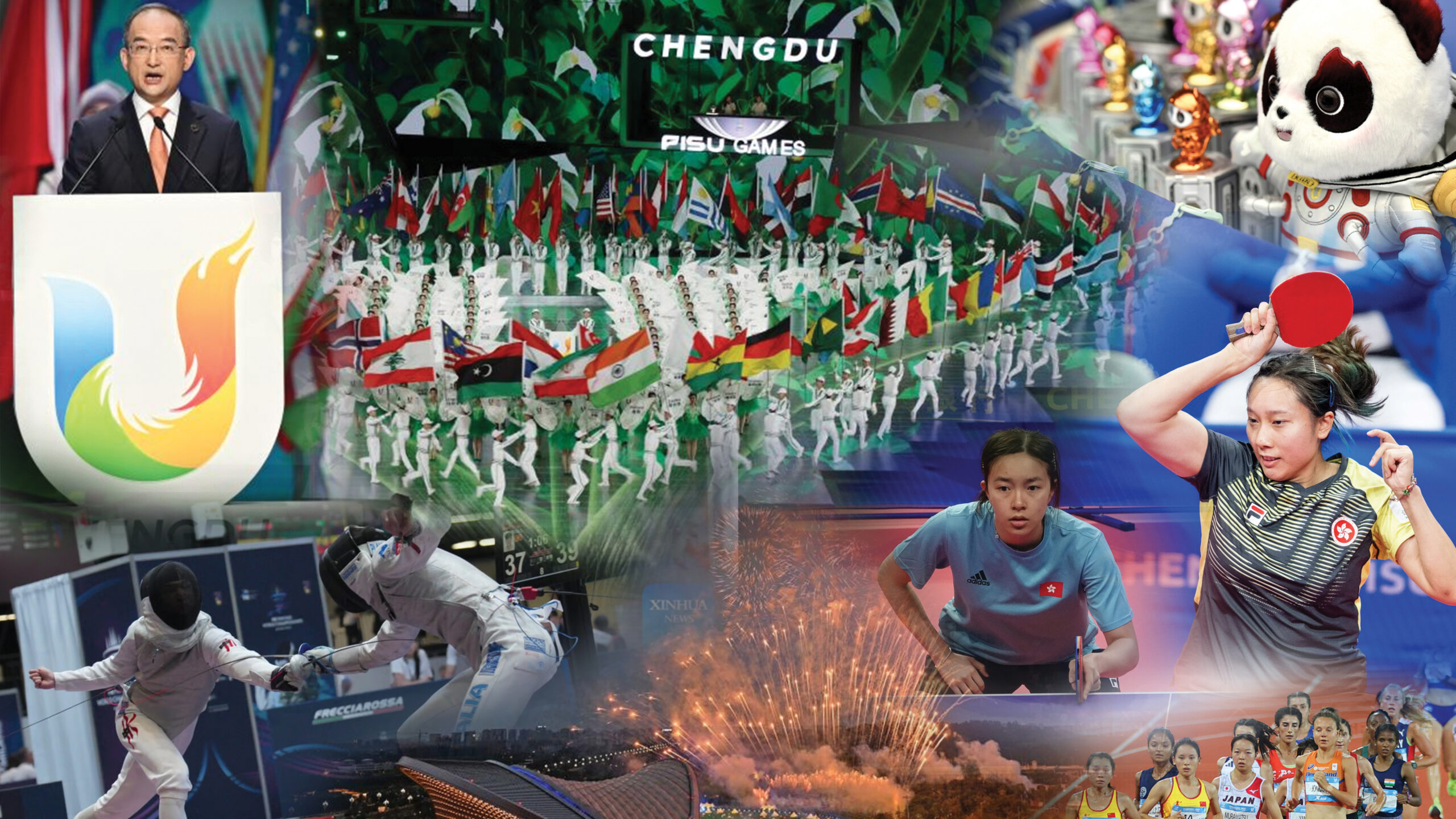
Best Games Ever: While covering themselves in glory, Hong Kong’s medal heroes also spread sporting joy throughout society
The FISU World University Games in Chengdu, China, were ones to remember for Hong Kong and its athletes. Astonishingly, their medal haul – 12 including 4 golds – matched Hong Kong’s combined total at all previous games. While friendships were forged and great individual and team battles played out, this summer’s edition of the biennial world student games will undoubtedly leave a lasting sporting legacy for the city. There were moments of supreme personal achievement and performances representing the pinnacle of sporting excellence.
Most impressive was the achievement of Hong Kong fencing superstar Edgar Cheung Ka-long, who notched up double gold, in the Men’s Individual Foil and the Team Foil. The 26-year-old, who is studying for a bachelor’s degree in Physical Education and Recreation Management at Hong Kong Baptist University (HKBU), is no stranger to the winner’s podium, having bagged the gold medal at the 2021 Tokyo Olympics in the same individual event.
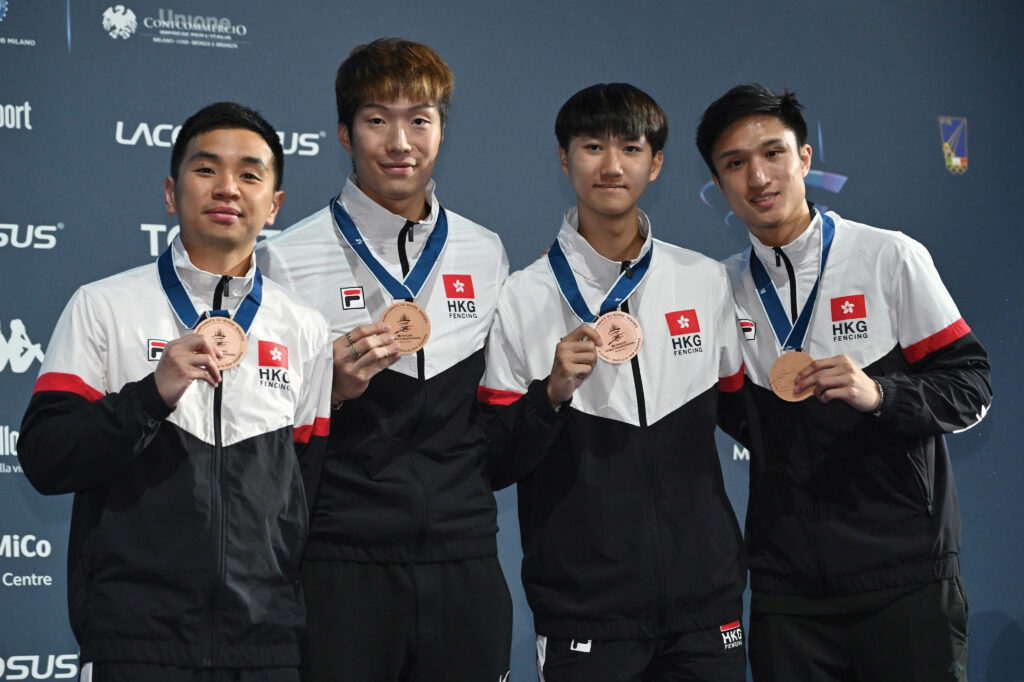
Professor Alexander Wai, President and Vice- Chancellor of HKBU, expressed immense pride in his student’s unwavering perseverance and determination, further stating: “His exceptional performance has solidified his position as one of the world’s top fencers, and we are all expecting him to reach new heights in the field.” Cheung’s achievement in winning two gold medals at a single World University Games was last matched by Hong Kong swimmer Siobhan Haughey at the 2017 edition in Taipei.
Win win for Hong Kong
In total, Hong Kong won four gold, one silver and seven bronze medals in Chengdu. Dr. Hon Sze-Sze of the HKBU’s Department of Sport, Physical Education & Health believes the success of Hong Kong athletes at the 31st University Games will enhance the perception of sports and boost participation in a city where traditionally it has ranked low in the public consciousness. “It is important for people to see that Hong Kong athletes could compete in high-level sports competitions and find success there, proving that it is not just a wild dream for young kids wanting to reach the Olympics one day,” she says.
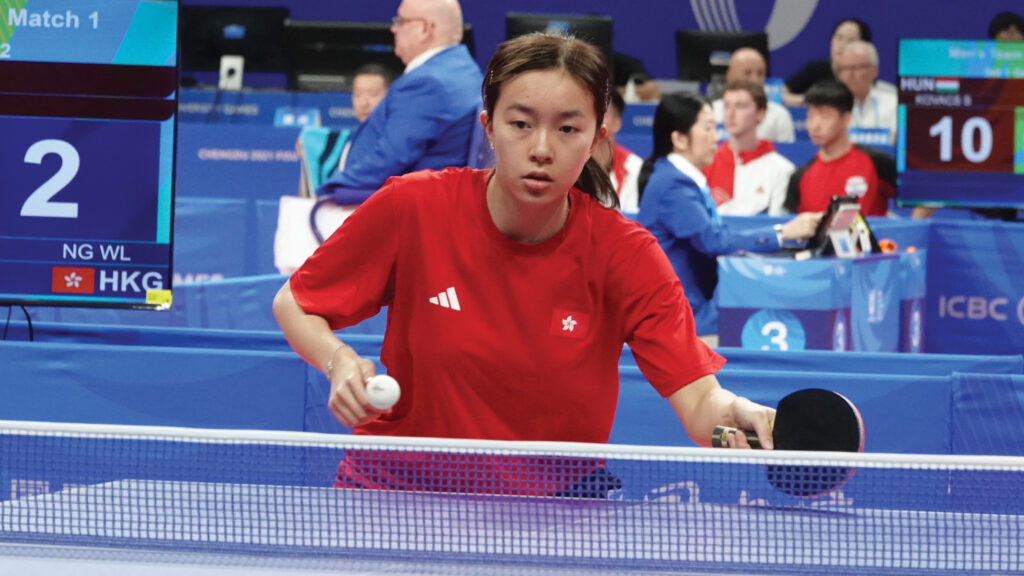
Hon is convinced successful role models are much needed for aspiring young athletes and children alike. Regarding its value for sporting exposure, she places the games organised by the International University Sports Federation (FISU) just second to the Olympics in terms of the number of participants and the level of sporting excellence. “In terms of spectatorship, it is undoubtedly very successful in drawing a good audience,” she stresses, adding: “The World University Games is seen as a platform where young student-athletes can learn from peers of diverse culture and background; it is not merely a gathering to demonstrate athletic prowess.”
Beyond sporting excellence
The stated aim of HKBU’s Physical Education and Recreation Management degree is to provide students with sufficient depth and breadth of knowledge, skills and practical experience in the discipline. While the course is not focused on training elite athletes in technical sports skills per se, it would certainly support student-athletes in pursuing their sporting goals while studying. “In addition, under the ethos of ‘whole person education’ of HKBU, our students will receive a strong liberal arts education to prepare them for a variety of careers,” says Hon.
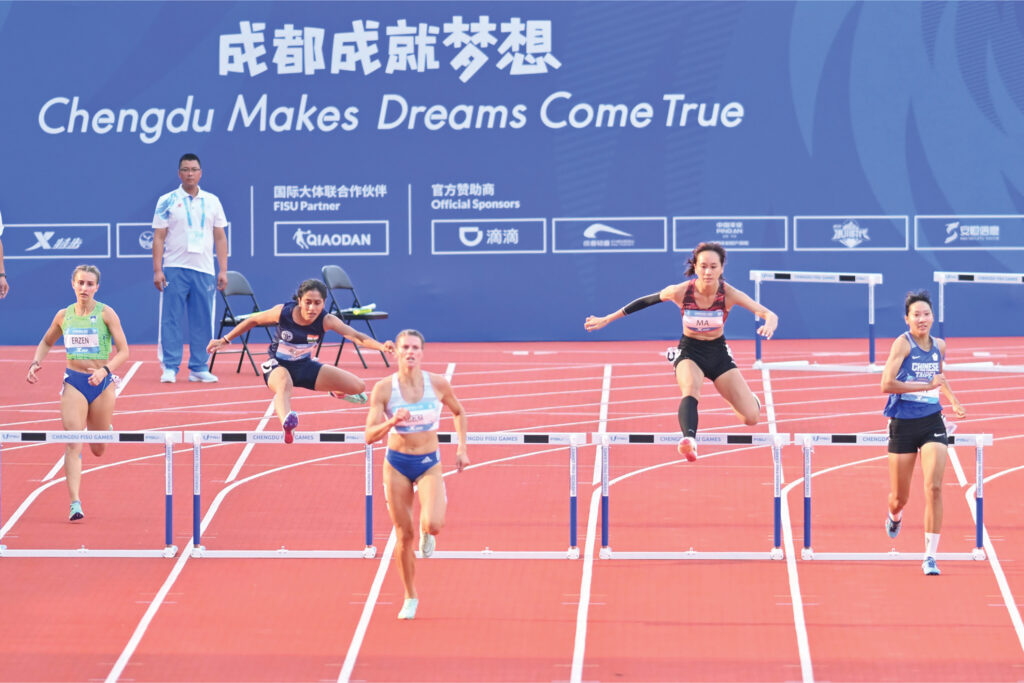
Other notable student-athletes studying at HKBU have competed in major games. Recently retired top track cyclist Sarah Lee Wai-sze, who won two bronze medals at separate Olympics, graduated from its Creative and Professional Writing programme. The university also had other athletes at the World University Games who performed well, such as wushu star Lau Chi-lung, who won a silver medal in the Men’s nanquan. His achievement represents triumph over adversity as he suffered a serious knee injury a couple of years previously. Hon says Lau’s example will inspire others to overcome setbacks through hard work and self-discipline.
University support
She points out that HKBU and other local universities offer different categories of scholarships to encourage current and retiring athletes to engage in academic programs which help to expand their future career prospects. Cheung, for instance, was one of the scholarship awardees under HKBU’s Talented Athletes Direct Admission Scheme last year.
According to HKBU’s website, the scheme provides funding for eligible applicants who have sport talent and achieved outstanding results in sport at admission. Funding is renewable for the normal duration of the course, subject to the student’s academic results, good progress in sport training and performance, as well as contributions to the Sport Leadership Programme.
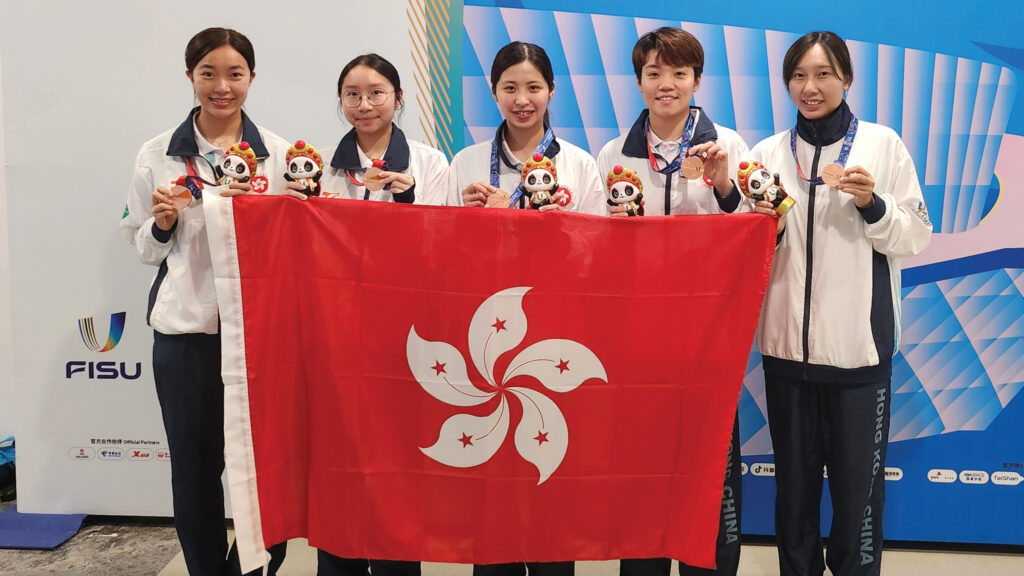
The Hong Kong University of Science and Technology (HKUST) also provided medal winners at the Games and encourages students with exceptional athletic abilities to enrol through various admission programmes. A spokesperson indicated that as part of this commitment, HKUST has enhanced its Student Athletes Admissions Scheme to offer special admissions consideration based on sport achievements, as well as flexible study arrangements, scholarships, living allowances, academic accommodation and other relevant assistance, allowing student-athletes to pursue their sporting and academic goals simultaneously.
Citywide, the University Grants Committee of Hong Kong, which embraces eight universities, paves the way for sports stars to gain tertiary education. It maintains the Student-Athlete Learning Support and Admission Scheme to promote sport achievement-based university admissions for local athletes.
Power of sport
HKUST says it recognises the wider personal and developmental benefits of sports and its ability to foster a sense of belonging, dedication and enjoyment among students. To this end, there are more than 30 sports clubs at the university and over 50 HKUST sports teams participating in intercollegiate, local and international competitions. All new undergraduates are required to take the sports skill class within its Behavioral Foundations of University Education: Habits, Mindsets and Wellness course in their first year of study to learn how to maintain a well- balanced and healthy lifestyle.
The Hong Kong Jockey Club’s Athlete Incentive Awards Scheme rewarded those athletes who achieved success at the World University Games. Monetary bonuses provide extra incentives for top- level performance, according to Hon, who points out that many athletes devote a great deal of time to training and competitions. “However, I do not think many athletes are aiming to earn big money through their sports endeavours,” she says. “Most of them do it because of the pure love of the sport itself.”
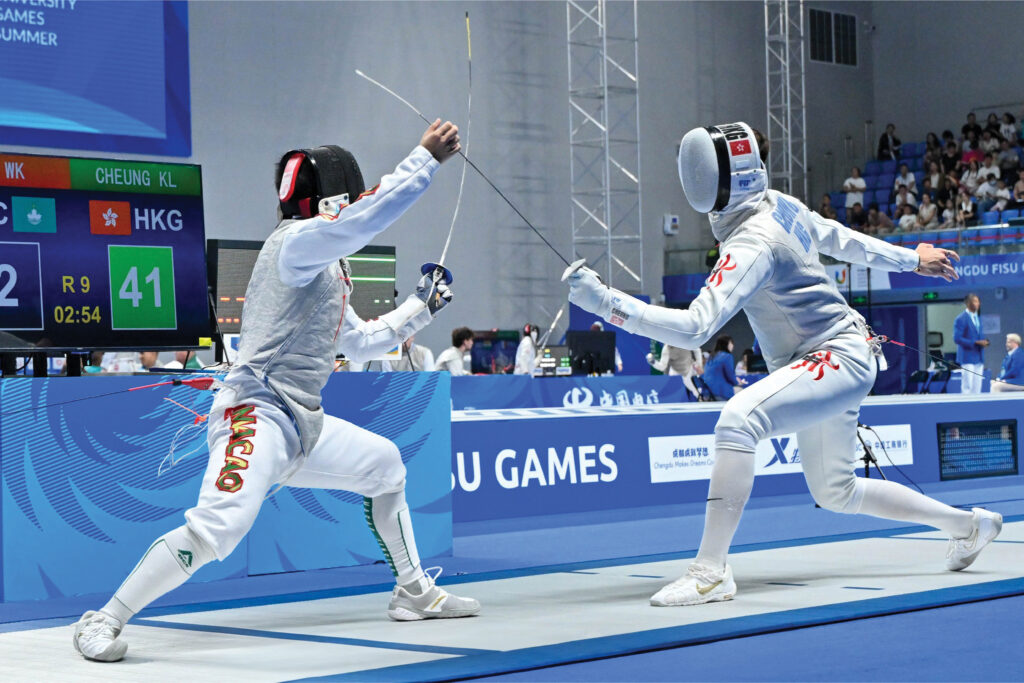
Hon also notes many are driven by a continual desire to improve their performance levels. Hong Kong’s world-class fencer is a classic example of a person driven to succeed. Soon after his latest gold medal triumph, Cheung told the assembled media: “I don’t think about anything. My mind is just ‘be a warrior, just fight’.”
The Asian Games in Hangzhou, which begin on 23 September, is the next opportunity for the city’s sports warriors to shine.







